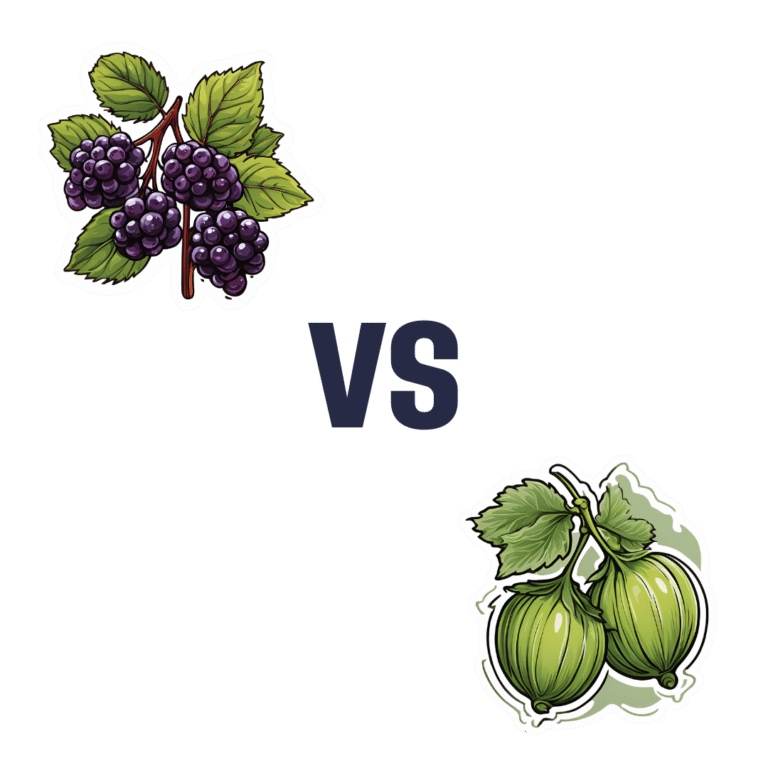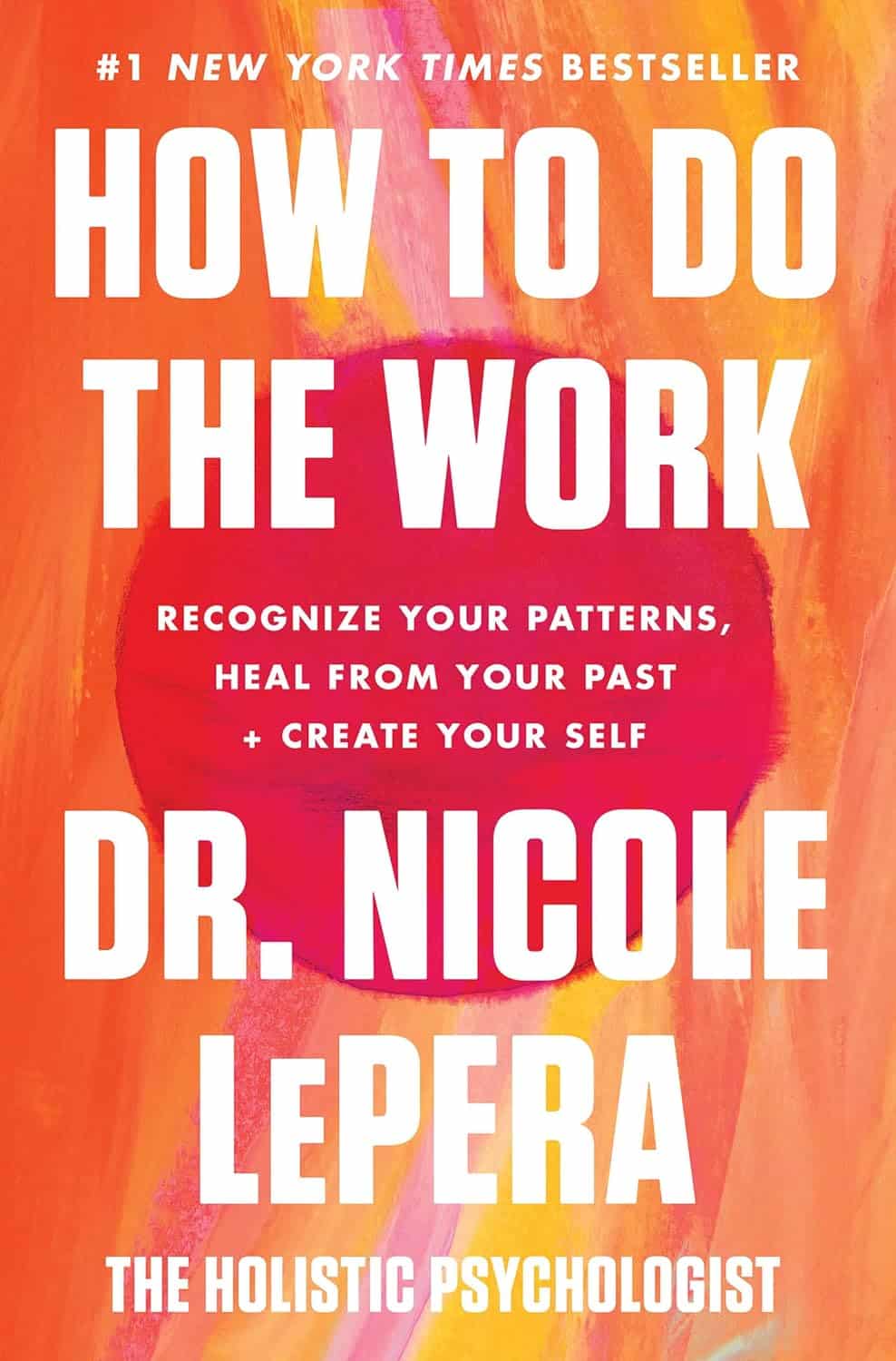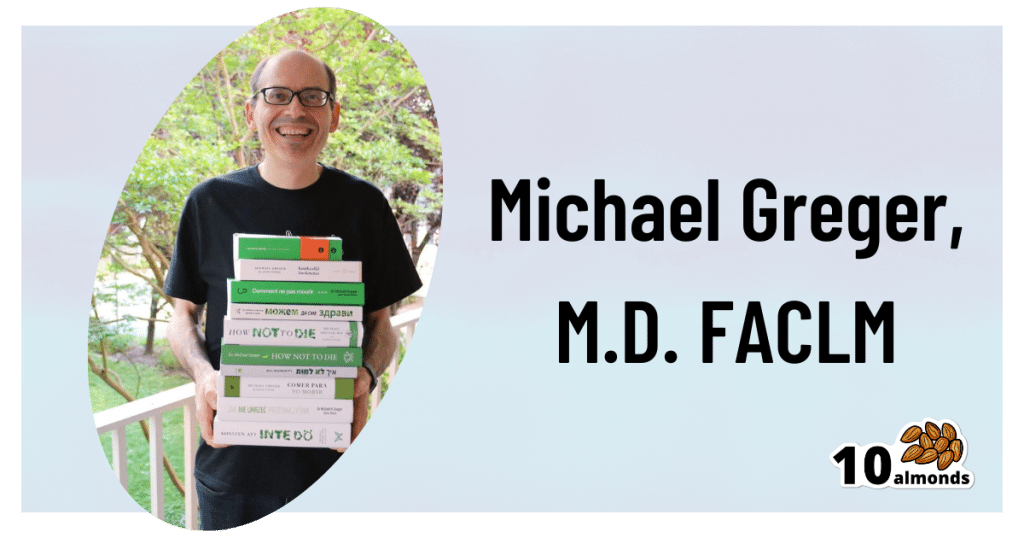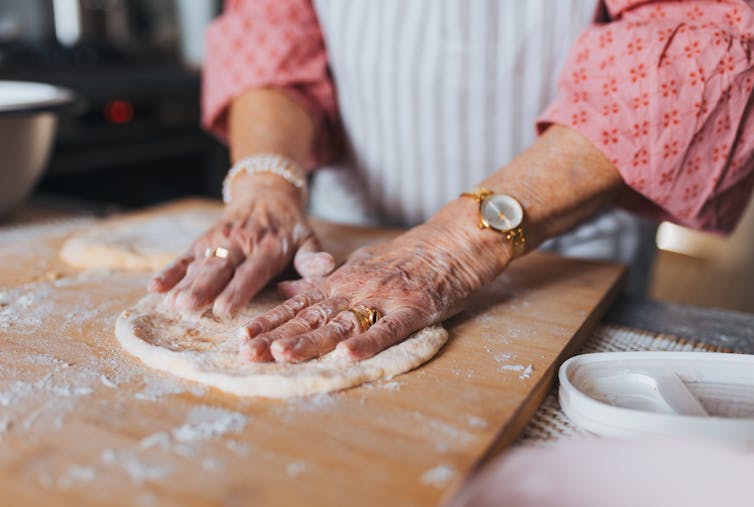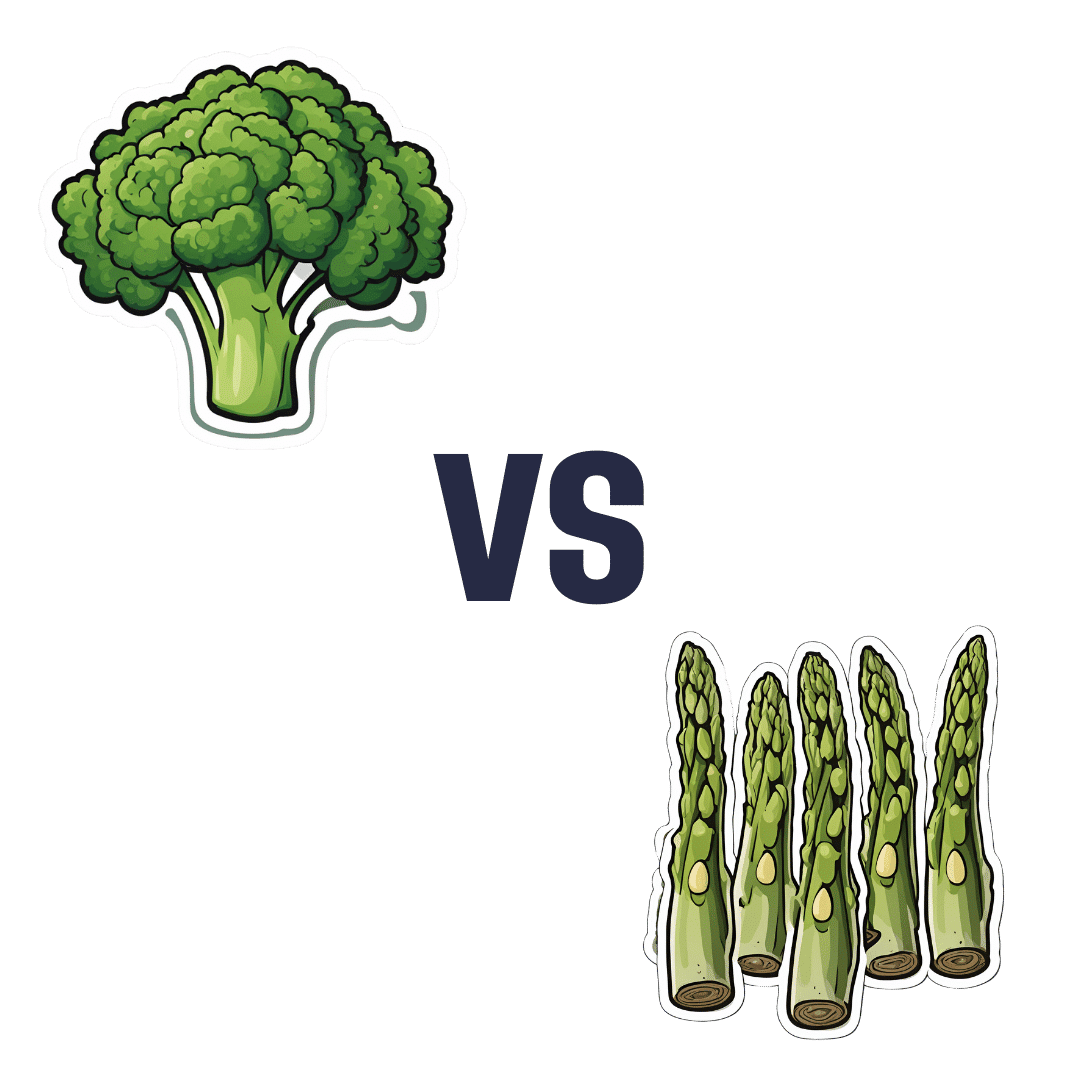
Broccoli vs Asparagus – Which is Healthier?
10almonds is reader-supported. We may, at no cost to you, receive a portion of sales if you purchase a product through a link in this article.
Our Verdict
When comparing broccoli to asparagus, we picked the broccoli.
Why?
Both are great! But broccoli does distinguish itself:
In terms of macros, broccoli has slightly more protein, carbs, and fiber. The two vegetables have the same glycemic index. We’ll call this a slight win for broccoli based mainly on the higher fiber, but it’s not by a huge amount.
When it comes to vitamins, broccoli has more of vitamins B5, B6, B9, C, K, and choline, whereas asparagus has more of vitamins A, B1, B2, B3, and E. This would already be a 6:5 marginal win for broccoli, but it’s worth bearing in mind that broccoli’s margins are greater, especially with broccoli having around 15x the amount of vitamin C. So, a clear win for broccoli, respectable as asparagus may be.
In the category of minerals, broccoli has more calcium, magnesium, manganese, phosphorus, potassium, and selenium, while asparagus boasts more copper, iron, and zinc. A 6:3 win for broccoli here.
Both vegetables also contain generous amounts of antioxidant polyphenols and other beneficial phytochemicals, often a little different from each other, so that’s a case for enjoying both.
Still, if you’re going to pick just one, we recommend the broccoli!
Want to learn more?
You might like to read:
Take care!
Don’t Forget…
Did you arrive here from our newsletter? Don’t forget to return to the email to continue learning!
Recommended
Learn to Age Gracefully
Join the 98k+ American women taking control of their health & aging with our 100% free (and fun!) daily emails:
-
Mushrooms vs Eggplant – Which is Healthier?
10almonds is reader-supported. We may, at no cost to you, receive a portion of sales if you purchase a product through a link in this article.
Our Verdict
When comparing mushrooms to eggplant, we picked the mushrooms.
Why?
First, you may be wondering: which mushrooms? Button mushrooms? White mushrooms? Chestnut mushrooms? Portobello mushrooms? And the answer is yes. Those (and more; it represents most mushrooms that are commonly sold fresh in western supermarkets) are all the same species at different ages; namely, Agaricus bisporus—not to be mistaken for fly agaric, which despite the name, is not even a member of the Agaricus genus, and is in fact Amanita muscari. This is an important distinction, because fly agaric is poisonous, though fatality is rare, and it’s commonly enjoyed recreationally (after some preparation, which reduces its toxicity) for its psychoactive effects. It’s the famous red one with white spots. Anyway, today we will be talking instead about Agaricus bisporus, which is most popular western varieties of “edible mushroom”.
With that in mind, let’s get down to it:
In terms of macros, mushrooms contain more than 3x the protein, while eggplant contains nearly 2x the carbs and 3x the fiber. We’ll call this a tie for macros.
As for vitamins, mushrooms contain more of vitamins B1, B2, B3, B5, B6, B7, B9, B12, D, and choline, while eggplant contains more of vitamins A, E, and K. Most notably for vegans, mushrooms are a good non-animal source of vitamins B12 and D, which nutrients are not generally found in plants. Mushrooms, of course, are not technically plants. In any case, the vitamins category is an easy win for mushrooms.
When it comes to minerals, mushrooms have more copper, iron, phosphorus, potassium, selenium, and zinc, while eggplant has more calcium, magnesium, and manganese. Another easy win for mushrooms.
One final thing worth noting is that mushrooms are a rich source of the amino acid ergothioneine, which has been called a “longevity vitamin” for its healthspan-increasing effects (see our article below).
Meanwhile, in the category of mushrooms vs eggplant, mushrooms don’t leave much room for doubt and are the clear winner here.
Want to learn more?
You might like to read:
The Magic of Mushrooms: “The Longevity Vitamin” (That’s Not A Vitamin)
Take care!
Share This Post
-
How to Do the Work – by Dr. Nicole LaPera
10almonds is reader-supported. We may, at no cost to you, receive a portion of sales if you purchase a product through a link in this article.
We have reviewed some self-therapy books before, and they chiefly have focused on CBT and mindfulness, which are great. This one’s different.
Dr. Nicole LaPera has a bolder vision for what we can do for ourselves. Rather than giving us some worksheets for unraveling cognitive distortions or clearing up automatic negative thoughts, she bids us treat the cause, rather than the symptom.
For most of us, this will be the life we have led. Now, we cannot change the parenting style(s) we received (or didn’t), get a redo on childhood, avoid mistakes we made in our adolescence, or face adult life with the benefit of experience we gained right after we needed it most. But we can still work on those things if we just know how.
The subtitle of this book promsies that the reader can/will “recognise your patterns, heal from your past, and create your self”.
That’s accurate, for the content of the book and the advice it gives.
Dr. LaPera’s focus is on being our own best healer, and reparenting our own inner child. Giving each of us the confidence in ourself; the love and care and/but also firm-if-necessary direction that a (good) parent gives a child, and the trust that a secure child will have in the parent looking after them. Doing this for ourselves, Dr. LaPera holds, allows us to heal from traumas we went through when we perhaps didn’t quite have that, and show up for ourselves in a way that we might not have thought about before.
If the book has a weak point, it’s that many of the examples given are from Dr. LaPera’s own life and experience, so how relatable the specific examples will be to any given reader may vary. But, the principles and advices stand the same regardless.
Bottom line: if you’d like to try self-therapy on a deeper level than CBT worksheets, this book is an excellent primer.
Click here to check out How To Do The Work, and empower yourself to indeed do the work!
Share This Post
-
Wouldn’t It Be Nice To Have Regenerative Superpowers?
10almonds is reader-supported. We may, at no cost to you, receive a portion of sales if you purchase a product through a link in this article.
The Best-Laid Schemes of Mice and Medical Researchers…
This is Dr. Ellen Heber-Katz. She’s an internationally-renowned immunologist and regeneration biologist, but her perhaps greatest discovery was accidental.
Unlike in Robert Burns’ famous poem, this one has a happy ending!
But it did involve the best-laid schemes of mice and medical researchers, and how they did indeed “gang gagly“ (or in the English translation, “go awry”).
How it started…
Back in 1995, she was conducting autoimmune research, and doing a mouse study. Her post-doc assistant was assigned to punch holes in the ears of mice that had received an experimental treatment, to distinguish them from the control group.
However, when the mice were later checked, none of them had holes (nor even any indication there ever had been holes punched)—the experiment was ruined, though the post-doc swore she did her job correctly.
So, they had to start from scratch in the new year, but again, a second batch of mice repeated the trick. No holes, no wounds, no scarring, not disruption to their fur, no damage to the cartilage that had been punched through.
In a turn of events worthy of a superhero origin story, they discovered that their laboratory-made autoimmune disease had accidentally given the mice super-healing powers of regeneration.
In the animal kingdom, this is akin to a salamander growing a new tail, but it’s not something usually found in mammals.
Read: A New Murine Model for Mammalian Wound Repair and Regeneration
How it’s going…
Dr. Heber-Katz and colleagues took another 20 years of work to isolate hypoxia-inducible factor-1a (HIF-1a) as a critical molecule that, if blocked, would eliminate the regenerative response.
Further, a drug (which they went on to patent), 1,4-dihydrophenonthrolin-4-one-3-carboxylic acid (1,4-DPCA), chemically induced this regenerative power:
See: Drug-induced regeneration in adult mice
Another 5 years later, they found that this same drug can be used to stimulate the regrowth of bones, too:
And now…
The research is continuing. Here’s the latest, a little over a month ago:
Epithelial–mesenchymal transition: an organizing principle of mammalian regeneration
Regrowing nerves has also been added into the list of things the drug can do.
What about humans?
Superpowered mice are all very well and good, but when can we expect this in humans?
The next step is testing the drug in larger animals, which she hopes to do next year, followed eventually by studies in humans.
Read the latest:
Regrowing nerves and healing without scars? A scientist’s career-long quest comes closer to fruition
Very promising!
Share This Post
Related Posts
-
Brain Food? The Eyes Have It!
10almonds is reader-supported. We may, at no cost to you, receive a portion of sales if you purchase a product through a link in this article.
Brain Food? The Eyes Have It!
This is Dr. Michael Greger, M.D. FACLM, of “Dr. Greger’s Daily Dozen” and “How Not To Die” fame, and he wants us to protect our brains (and while we’re at it, our eyesight).
And the secret is…
Lutein.
This is a carotenoid, which is super important for the eyes and brain. Not to be confused with carrots, which despite the name are usually not a good source of carotenoids!
They do however contain lots of beta-carotene, a form of vitamin A, but that (and the famous WW2-era myth born of deliberate disinformation by the British government) isn’t what we’re covering today.
We say “eyes and brain” but really, the eyes are just an extension of the brain in any case.
Pedantry aside, what Dr. Greger wants you to know about lutein is how important it is for the protection of your brain/eyes, both against cognitive decline and against age-related macular degeneration (the most common cause of eyesight loss in old age).
Important take-away info:
- Two things that hasten brain aging are inflammation and oxidative stress. Antioxidant and anti-inflammatory foods mitigate those.
- Researchers investigated eight different dietary antioxidants, including vitamins A and E. Only lutein was “significantly related to better cognition”.
- The macula in the middle of our retina is packed with lutein, and levels in the retina correspond to levels in the rest of our brain.
- Alzheimer’s patients have significantly less lutein in their eyes and in their blood, and a higher occurrence of macular degeneration.
- Dark green leafy vegetables are lutein superstars. A half cup of kale has 50 times more lutein than an egg.
Want to know more about the Dr. Greger’s Daily Dozen approach to health?
See the Website / Get the App (Android & iOS) / Get the Science Book / Get the Cookbook!
Don’t Forget…
Did you arrive here from our newsletter? Don’t forget to return to the email to continue learning!
Learn to Age Gracefully
Join the 98k+ American women taking control of their health & aging with our 100% free (and fun!) daily emails:
-
Are You Making This Alcohol Mistake?
10almonds is reader-supported. We may, at no cost to you, receive a portion of sales if you purchase a product through a link in this article.
The famous “small glass of red per day” is, as is quite well-established now in science, but not so much in popular culture, known to be not a good idea.
What most people don’t know
Rethinking “One Drink a Day”:
- Outdated beliefs and flawed studies:
- The idea that “one drink a day is healthy” stems from flawed associative studies that included…
- unhealthy former heavy drinkers in the zero-drinks category, and
- healthy older individuals who continued light drinking due to good health, not because alcohol contributed to it, in the drinkers category
- In other words, they looked at former alcoholics whose health was ruined by drinking and said “aha, non-drinkers have bad health”, and looked at the survivors of survivorship bias and said “aha, light drinking is the key to good health”. Which of course is terrible science propped up by terrible abuse of statistics propped up by shoddy methodology.
- The idea that “one drink a day is healthy” stems from flawed associative studies that included…
- New research findings:
- A 2022 UK Biobank Study showed that even one drink a day leads to brain shrinkage, neuron death, and cognitive decline.
- Another study on CVD disproved the notion that light drinking benefits heart health once confounding variables were removed.
- There are plenty more, and at 10almonds we’ve done a main feature about it, but for now, you get the idea.
Some other things you should know:
Ethanol and acetaldehyde damage neurons responsible for impulse control, judgment, motor coordination, and memory formation, leading to cognitive decline. The feeling of being drunk results from the suppression and damage of these neurons. But while the drunk feeling wears off, the damage to neurons does not.
Alcohol causes cumulative DNA damage in neurons, accelerates brain aging, and prevents the formation of new neurons, similar to a slow, gradual stroke.
Broader Health Impacts of Alcohol
We’ve said it before, and we’ll say it again: alcohol is bad for pretty much everything.
Here are some examples mentioned in the video:
- Neurodegenerative diseases: heavy drinking increases the risk of Alzheimer’s, particularly in those genetically predisposed.
- Sleep disruption: alcohol reduces deep, restful sleep and hampers the brain’s natural detox process overnight, contributing to morning grogginess.
- Inflammation and immune suppression: alcohol increases inflammation, exacerbates autoimmune diseases (like psoriasis and arthritis), and weakens immune function.
- Cancer risk: alcohol is classified as a Group 1 carcinogen by the International Agency for Research on Cancer, linked to various cancers, especially breast cancer. Even light drinking increases breast cancer risk.
- Hormonal imbalances: in women, alcohol heightens PMS symptoms, reduces fertility, and increases testosterone. In men, it lowers sperm quality and disrupts hormones.
For more on all of these and more, enjoy:
Click Here If The Embedded Video Doesn’t Load Automatically!
Want to learn more?
You might also like to read:
- Can We Drink To Good Health? ← this is mostly about red wine and heart health
- How To Reduce Or Quit Alcohol ← this is about the more general reasons to quit, and how to do so
- What Happens To Your Body When You Stop Drinking Alcohol ← a realistic timeline of recovery
Take care!
Don’t Forget…
Did you arrive here from our newsletter? Don’t forget to return to the email to continue learning!
Learn to Age Gracefully
Join the 98k+ American women taking control of their health & aging with our 100% free (and fun!) daily emails:
- Outdated beliefs and flawed studies:
-
Tastes from our past can spark memories, trigger pain or boost wellbeing. Here’s how to embrace food nostalgia
10almonds is reader-supported. We may, at no cost to you, receive a portion of sales if you purchase a product through a link in this article.
Have you ever tried to bring back fond memories by eating or drinking something unique to that time and place?
It could be a Pina Colada that recalls an island holiday? Or a steaming bowl of pho just like the one you had in Vietnam? Perhaps eating a favourite dish reminds you of a lost loved one – like the sticky date pudding Nanna used to make?
If you have, you have tapped into food-evoked nostalgia.
As researchers, we are exploring how eating and drinking certain things from your past may be important for your mood and mental health.
Halfpoint/Shutterstock Bittersweet longing
First named in 1688 by Swiss medical student, Johannes Hoffer, nostalgia is that bittersweet, sentimental longing for the past. It is experienced universally across different cultures and lifespans from childhood into older age.
But nostalgia does not just involve positive or happy memories – we can also experience nostalgia for sad and unhappy moments in our lives.
In the short and long term, nostalgia can positively impact our health by improving mood and wellbeing, fostering social connection and increasing quality of life. It can also trigger feelings of loneliness or meaninglessness.
We can use nostalgia to turn around a negative mood or enhance our sense of self, meaning and positivity.
Research suggests nostalgia alters activity in the brain regions associated with reward processing – the same areas involved when we seek and receive things we like. This could explain the positive feelings it can bring.
Nostalgia can also increase feelings of loneliness and sadness, particularly if the memories highlight dissatisfaction, grieving, loss, or wistful feelings for the past. This is likely due to activation of brain areas such as the amygdala, responsible for processing emotions and the prefrontal cortex that helps us integrate feelings and memories and regulate emotion.
How to get back there
There are several ways we can trigger or tap into nostalgia.
Conversations with family and friends who have shared experiences, unique objects like photos, and smells can transport us back to old times or places. So can a favourite song or old TV show, reunions with former classmates, even social media posts and anniversaries.
What we eat and drink can trigger food-evoked nostalgia. For instance, when we think of something as “comfort food”, there are likely elements of nostalgia at play.
Foods you found comforting as a child can evoke memories of being cared for and nurtured by loved ones. The form of these foods and the stories we tell about them may have been handed down through generations.
Food-evoked nostalgia can be very powerful because it engages multiple senses: taste, smell, texture, sight and sound. The sense of smell is closely linked to the limbic system in the brain responsible for emotion and memory making food-related memories particularly vivid and emotionally charged.
But, food-evoked nostalgia can also give rise to negative memories, such as of being forced to eat a certain vegetable you disliked as a child, or a food eaten during a sad moment like a loved ones funeral. Understanding why these foods evoke negative memories could help us process and overcome some of our adult food aversions. Encountering these foods in a positive light may help us reframe the memory associated with them.
Just like mum used to make. Food might remind you of the special care you received as a child. Galina Kovalenko/Shutterstock What people told us about food and nostalgia
Recently we interviewed eight Australians and asked them about their experiences with food-evoked nostalgia and the influence on their mood. We wanted to find out whether they experienced food-evoked nostalgia and if so, what foods triggered pleasant and unpleasant memories and feelings for them.
They reported they could use foods that were linked to times in their past to manipulate and influence their mood. Common foods they described as particularly nostalgia triggering were homemade meals, foods from school camp, cultural and ethnic foods, childhood favourites, comfort foods, special treats and snacks they were allowed as children, and holiday or celebration foods. One participant commented:
I guess part of this nostalgia is maybe […] The healing qualities that food has in mental wellbeing. I think food heals for us.
Another explained
I feel really happy, and I guess fortunate to have these kinds of foods that I can turn to, and they have these memories, and I love the feeling of nostalgia and reminiscing and things that remind me of good times.
Yorkshire pudding? Don’t mind if I do. Rigsbyphoto/Shutterstock Understanding food-evoked nostalgia is valuable because it provides us with an insight into how our sensory experiences and emotions intertwine with our memories and identity. While we know a lot about how food triggers nostalgic memories, there is still much to learn about the specific brain areas involved and the differences in food-evoked nostalgia in different cultures.
In the future we may be able to use the science behind food-evoked nostalgia to help people experiencing dementia to tap into lost memories or in psychological therapy to help people reframe negative experiences.
So, if you are ever feeling a little down and want to improve your mood, consider turning to one of your favourite comfort foods that remind you of home, your loved ones or a holiday long ago. Transporting yourself back to those times could help turn things around.
Megan Lee, Senior Teaching Fellow, Psychology, Bond University; Doug Angus, Assistant Professor of Psychology, Bond University, and Kate Simpson, Sessional academic, Bond University
This article is republished from The Conversation under a Creative Commons license. Read the original article.
Don’t Forget…
Did you arrive here from our newsletter? Don’t forget to return to the email to continue learning!
Learn to Age Gracefully
Join the 98k+ American women taking control of their health & aging with our 100% free (and fun!) daily emails:

